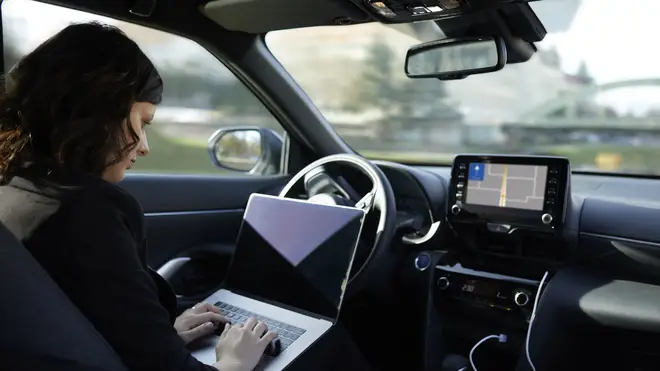Motorists in self-driving cars can watch TV behind wheel in Highway Code change
20 April 2022, 08:23 | Updated: 5 October 2022, 12:03

Heart Breakfast's Amanda Holden and Jamie Theakston talk about self-driving cars
Watching TV in self-driving cars will be allowed under a change to the Highway Code.
Listen to this article
People using self-driving cars will be allowed to watch television on built-in screens under proposed new rules.
While it will still be illegal to use a mobile phone behind the wheel, drivers will be allowed to watch TV and films if they are travelling below 37mph.
According to the government, the changes will say that drivers must be ready to take back control of vehicles if needed.
- Martin Lewis issues council tax scam warning to anyone waiting for a £150 rebate
- Tom Parker’s wife Kelsey reveals star’s funeral details and asks fans to line the streets today
- Man wins £350,000 lawsuit after his employer threw him a birthday party he didn't want

While there are currently no self-driving vehicles approved on roads in the UK yet, the first could be given the green light as early as this year.
Primarily, the use of the technology is likely to be when drivers are moving at slow speeds like on motorways in congested traffic.
The proposed Highway Code update comes after a public consultation and has been called an ‘interim measure’ in support of the distribution of self-driving vehicles.
It will also say drivers will not be held responsible if they crash.
The Department for Transport (DfT) has said that in the event of an accident, insurance companies will be liable for claims.

This comes after the government announced in April last year that hands-free driving in vehicles with lane-keeping technology had been given the go ahead.
Automated lane-keeping system technology lets a vehicle drive in a single lane, up to 37mph (60kmph).
Motorists should be ready to take back control from an automated system when prompted, for example when coming off the motorway.
This available technology is 'assistive', which means sers must remain in full control at all times.
Transport minister Trudy Harrison has said updating the Highway Code will be a "major milestone in our safe introduction of self-driving vehicles".
She added it will "revolutionise the way we travel, making our future journeys greener, safer and more reliable".























